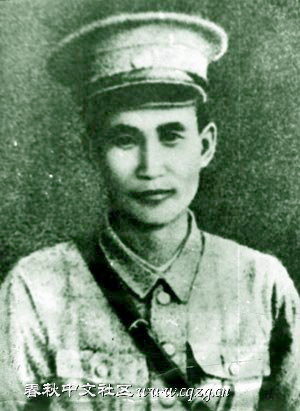Liu Zhidan: Difference between revisions
No edit summary |
No edit summary |
||
| Line 7: | Line 7: | ||
====Medium: [[:Category:Literature|Literature]]==== | ====Medium: [[:Category:Literature|Literature]]==== | ||
---- | ---- | ||
[[File:LiuZhidan.jpg|right]] | |||
'''Artist:''' Li Jiantong | '''Artist:''' Li Jiantong | ||
| Line 14: | Line 15: | ||
'''Location:''' China | '''Location:''' China | ||
'''Description of Artwork:''' The novel ''Liu Zhidan'' is a biography of the revolutionary Liu Zhidan, who had been a popular leader of communist guerrillas in the 1930's. <P> | '''Description of Artwork:''' The novel ''Liu Zhidan'' is a biography of the revolutionary Liu Zhidan, who had been a popular leader of communist guerrillas in the 1930's. <P> | ||
Latest revision as of 19:37, 24 December 2011
Date: 1962
Region: Asia
Subject: Political/Economic/Social Opinion
Medium: Literature
Artist: Li Jiantong
Confronting Bodies: Yan Hongyan (A leading party official), Kang Sheng (director of the Central Committee's Ideological Group), and Mao Zedong.
Date of Action: 1962
Location: China
Description of Artwork: The novel Liu Zhidan is a biography of the revolutionary Liu Zhidan, who had been a popular leader of communist guerrillas in the 1930's.
The Incident: Small sections of the novel had been published in newspapers in 1962. Yan Hongyan, a party official, had been strongly opposed to Liu Zhidan's leadership methods and complained to Kang Sheng.
Kang Sheng spoke in public about the novel and described it as "anti-party." He said it would spread negative ideologies and denounced it for portraying some of the party's enemies in a positive light. These accusations came to Mao Zedong's attention and led him to order an investigation surrounding Li Jiantong and her accomplices.
Results of Incident: Li Jiantong and her supporters were arrested by the police for dampening the impact of Mao's achievements through the praise of Liu Zhidan. They were put to "reform through labor" and the book was banned until 1978, by which time the opinion of Liu Zhidan was reversed to make him into a revolutionary hero.
Source: Censorship: A World Encyclopedia. Ed. Derek Jones. Chicago; London: Fitzroy Dearborn, 2001.
